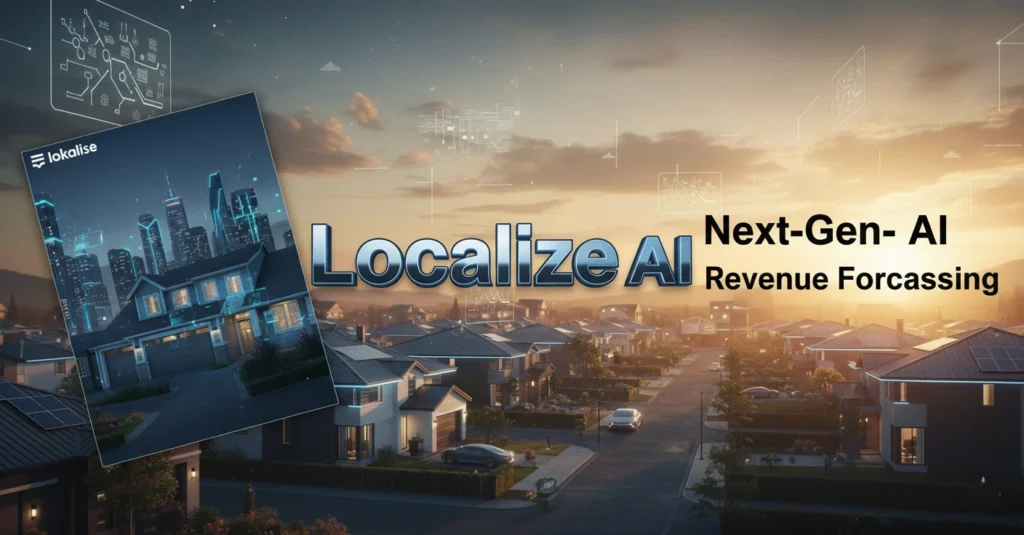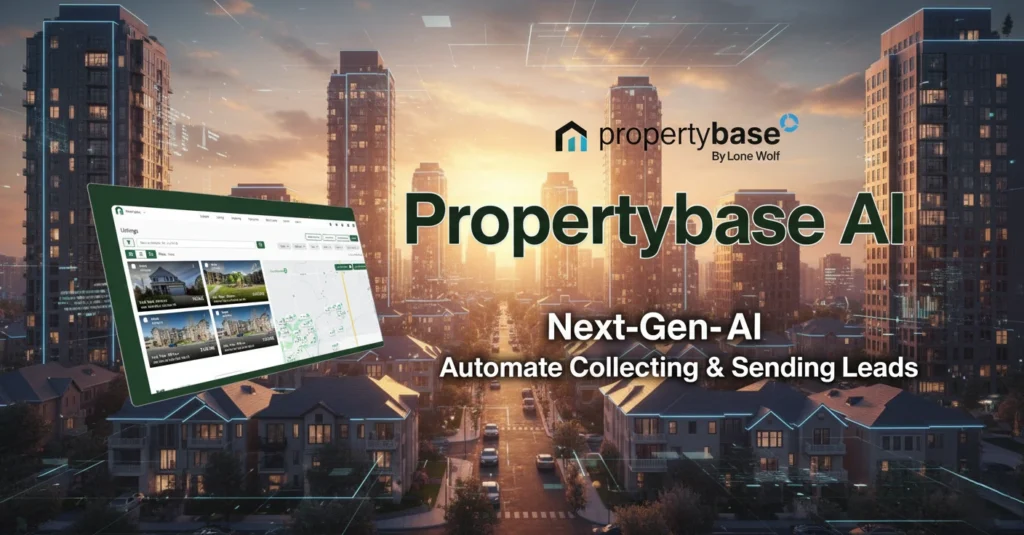It’s not just a good idea to stay ahead of the curve in the fast-paced world of real estate; it’s a must. The world is changing, and artificial intelligence (AI) is at the center of this change. AI used to only exist in science fiction, but now it’s a real and useful tool for real estate agents, from solos to small teams to large brokerages. Automating the boring tasks, making the customer experience more unique, and giving us a whole new way to look at the market.
There are huge perks for real estate agents. AI tools aren’t meant to take your place; they’re meant to make your business stronger. They do the boring, time-consuming jobs that you don’t have time to do, so you can do what you do best: build relationships, negotiate deals, and give great, customer-focused service.
This piece has everything you need to know about the best AI tools for real estate agents. As we go through this review, we’ll talk about why these tools are now necessary, what their main benefits are, and which 12 platforms are the most cutting-edge on the market. Get ready to learn how choosing the right AI technology can be the most important thing you do for your business this year, from developing leads to valuing properties and everything in between.
Why AI Tools For Real Estate Agents Are Useful
AI being used in real estate isn’t just a trend; it’s a smart move that pays off in a way that can be measured. AI tools for real estate agents make the business model more efficient, data-driven, and successful by automating and improving key tasks. Take a look at the main perks.
- Boosting Lead Generation and Nurturing
It’s the leads that keep a real estate business going. The best AI tools are those that can automate the first steps of getting a person interested. AI-powered robots on your website can qualify leads 24 hours a day, seven days a week by answering common questions and getting important contact information. Predictive analytics can look at past data and how people browse to find the leads that are most likely to turn into customers. This lets you focus your follow-up on prospects who are really interested in your business.
- Making Property Valuation and Market Research Better
The old way of valuing a property takes a lot of time and is often based on few similar sales. Automated Valuation Models (AVMs) powered by AI, such as HouseCanary, can look at huge amounts of data, such as market trends, local economic indicators, and even social media opinion, to give very accurate and almost instantaneous property valuations. This lets you give clients, whether they are buying or selling, data-backed advice on prices, making you look like a trusted expert.
- Providing Highly Customized Communication With Clients
Clients today want a unique experience. AI tools for real estate agents look at what their clients like and how they act to send them highly focused property suggestions. If a client keeps looking at homes with pools in a certain neighborhood, the AI can send them an email with new listings that are similar, and you won’t have to do anything. This level of personalized engagement keeps customers coming back to your site and not one of your competitors.
- Changing The Way Real Estate Is Marketed and Virtual Tours Are Used
These days, selling a house requires a lot of technology. The way real estate looks is changing thanks to AI. For example, photorealistic 3D walks and digital floorplans are being made possible by AI-powered virtual staging. These tools make listings stand out, which gets more hits and gives potential buyers a full, interactive experience that they can see from anywhere in the world.
- Spending Less Time and Getting More Done
The gift of time may be the most real benefit for busy workers. AI takes care of the “busy work” that slows you down, like writing listing descriptions, planning social media posts, handling CRM data, and even making professional reports. You can focus on more important tasks that need a human touch, like open houses, face-to-face talks, and negotiating deals, if you give these tasks to AI.
12 Best AI Tools For Real Estate Agents
There are a lot of AI tools for real estate agents on the market, but not all of them are good. The following is a hand-picked list of the 12 most important AI tools.
1. Zillow Premier Agent AI
Brief Introduction:
Zillow’s Premier Agent program has been a standard for agents for a long time, but its AI features have grown into a powerful tool. Virtual Staging, which is driven by AI, is the newest feature. It lets agents quickly and directly change the look of photos for listings.
Key Features:
Virtual staging powered by AI, lead routing based on client search history, CRM integration, and analytics for tracking success are some of the most important features.
Who Can Use It:
- Agents and teams that already use the Premier Agent tool are the best ones to use it.
- It works best for people in the Zillow environment who want to improve their listings and make it easier for leads to become customers.
✅ Pros
- It works well with a huge current source of leads,
- AI-powered staging makes listings look better,
- It uses Zillow’s huge amount of data to qualify leads.
❌ Cons
- It can be pricey,
- Leads are often shared with other people.
- How well it works for you depends on your market and price point.
2. REX AI
Brief Introduction:
The Rex Software platform includes REX AI. The platform is an all-in-one system that includes a CRM, marketing tools, and a website builder. Your CRM data is used by REX AI to automate and improve marketing efforts and communication with clients.
Key Features
Best For:
- Small to medium-sized brokerages and teams looking for an all-in-one option are the best ones to use it for. It’s perfect for
- people who don’t want to switch between different platforms but still want to automate their marketing and keep up with their client information.
✅ Pros
- The all-in-one platform cuts down on the need for multiple subscriptions,
- The AI is specifically designed for real estate processes,
- There is a strong focus on data-driven prospecting.
❌ Cons
- The tool can be hard to understand at first, and it takes a while to learn how to use it properly.
- For individual agents, the price can be a problem.
3. CINC AI (Commissions Inc.)
Brief Introduction:
CINC is a powerful tool for getting leads and managing customer relationships that has been used by top-performing teams. Its AI part works on following up with leads and getting them interested, making sure that none of them get lost.
Key features:
- AI-powered behavioral messages, automated lead follow-up and nurturing, and a powerful CRM with lead-scoring tools.
Best for:
- Teams and brokerages that deal with a lot of work. It’s made for people who need a way to keep track of a lot of leads and automate a lot of contact.
✅ Pros
- It’s very good at generating leads and keeping in touch with them,
- It comes with a full set of tools for teams,
- It has a history of turning leads into clients.
❌ Cons
- It’s very pricey, with a high setup fee and high monthly fees,
- The method is hard to understand and takes a lot of time to get good at it.
4. kvCORE AI
Brief Introduction:
AI powers the Smart CRM that is at the heart of Inside Real Estate’s kvCORE platform. It’s meant to be a full solution for all types of agents and brokerages, from finding new clients to keeping track of transactions.
Key Features:
Marketing automation, behavioral nudges for workers, AI-driven lead routing and prioritization, and a smart CRM that reminds you to follow up.
Best For:
- That it works best for are individual agents, teams, and brokerages that want a system that does everything.
- It works especially well for people who want to automate their daily tasks so they can spend more time building relationships.
✅ Pros
- It’s easy to change things to fit your needs,
- It comes with a lot of tools, like websites and marketing campaigns,
- Its AI helps workers focus on the best leads.
❌ Cons
- The platform has a lot of tools, and some users say it takes a long time to learn how to use all of them.
5. RealScout AI
Brief Introduction:
RealScout’s AI is designed to make working together with clients better. It’s a platform that puts the customer first and uses machine learning and natural language processing to find houses for buyers in a way that isn’t possible with other platforms.
Key features:
- A collaborative search tool that keeps clients interested, emails that are written in natural language and include personalized alerts, and AI-powered property comparison.
Best For:
- Buyer’s agents and teams that want to give their clients a better, more joint home search experience.
- It works best for people who value their ties with clients and don’t want them to go to national portals.
✅ Pros
- It keeps customers interested in your branded platform,
- Its one-of-a-kind AI-powered comparison feature helps buyers make choices faster.
- It’s also great for building relationships with buyers.
❌ Cons
- It’s mostly a tool for buyers and not so much for generation of selling leads,
- Agents have to change how they talk to clients.
6. HouseCanary AI
Brief Introduction:
HouseCanary is a leader in data and analytics. Their AI is mostly used for automated valuation models (AVMs) and predictive analytics, which give real estate agents very accurate and up-to-date information on property prices.
Key Features:
- The CanaryAI platform gives you instant insights, automatic valuation reports, and market analytics that can predict price trends.
Best For:
- Real estate agents and buyers who need deep insights based on data.
- It’s one of the best AI tools for real estate agents who want to give their clients the best market analysis possible and help them make smart business choices.
✅ Pros
- It’s the most accurate way to value a property,
- It gives you an edge over the competition by looking at market trends,
- It has different price ranges to meet your needs.
❌ Cons
- It may focus more on data than on agents,
- It doesn’t have a lot of direct lead creation options,
- The best features are only available on more expensive plans.
7. Roof AI
Brief Introduction:
Roof AI is a chatbot-like AI assistant that is meant to live on your website and talk to possible customers 24 hours a day, 7 days a week. It uses advanced language models to answer questions about ads, neighborhoods, and the home-buying process in a way that sounds like a person.
Key Features:
Conversational AI that you can interact with, natural language search, automated lead conversion, and a real estate information base that gives you answers right away.
Best For:
- Agents whose websites get a lot of visitors who want to turn more of those visitors into approved leads.
- This works great for people who can’t answer questions all the time.
✅ Pros
- It works 24 hours a day, seven days a week, collecting leads; it gives website visitors a better, more interesting experience,
- It can be changed to fit your brand and your skills.
❌ Cons
- It’s only useful if it brings people to your website,
- The monthly fee might be too much for agents whose websites don’t get many visitors.
8. Localize AI
Brief Description:
Localize AI is more of a tool for site selection and real estate analytics, but its AI features can make a huge difference for real estate agents who work with businesses or investors. It works through huge mobile libraries to find the best places to put things based on how people use them.
Key Features:
- Revenue forecasting, market ranking, and cannibalization analysis that are all driven by AI.
Best For:
- Commercial real estate agents, franchise brokers, and real estate agents who work with buyers are the best people to use it.
- It’s not for every real estate agent, but it gives a small group of agents a huge edge.
✅ Pros
- It’s very useful for choosing locations based on data,
- It gives you a lot of information about how people behave and how many people are visiting by,
- It is something that makes your business stand out.
❌ Cons
- Cons: It’s very narrow and won’t work for most real estate agents; the value proposition is tied to certain business models.
9. Redfin AI
Brief Introduction:
Redfin is a brokerage that runs on technology. It uses AI for its own business and gives some of these tools to its workers. AI is built into Redfin’s platform, and it can do everything from find fraud to make unique home suggestions for clients.
Key features:
- Personalized property suggestions for clients driven by AI,
- A virtual assistant called “Ask Redfin,” and automatic lead-to-agent matching.
Best For:
- Agents who work with Redfin.
- However, agents from other brokerages can’t use the tools on their own because they are part of the brokerage’s website.
✅ Pros
- It gives clients a smooth, data-rich experience,
- Uses Redfin’s huge amount of data to give agents insights,
- Lets agents focus on tasks that involve working directly with clients.
❌ Cons
- Agents outside of the Redfin network can’t access the system because it’s company-owned and may not be as flexible as third-party tools.
10. Compass AI
Brief Introduction:
Compass has been a star in real estate technology, and AI is a big part of what it does. Compass AI is closely connected to its CRM, and it uses predictive analytics to find possible sellers and make agent tasks easier.
Key features:
- The “Likely to Sell” tool is powered by AI, and conversational AI lets you use your words to run workflows. Listing descriptions and social media posts are also made automatically.
Best For:
- Compass agents are the best people to use it for.
- The brokerage has a competitive edge thanks to these powerful tools, which were made for its own network of dealers and teams.
✅ Pros
- It works well with the Compass platform,
- The AI finds new business possibilities in an agent’s existing network,
- It streamlines daily tasks to make them more efficient.
❌ Cons
- The fact that it’s only for Compass agents means that most real estate workers can’t use it.
11. Propertybase AI
Brief Introduction:
Propertybase is a powerful CRM and marketing tool for real estate agencies that was built on the Salesforce platform. Its AI features are mainly used for managing leads, automating marketing, and speeding up transactions.
Key features:
Best For:
- Brokerages and big teams that need a system that can be tailored to their needs.
- It’s a powerful tool for people who need a platform that can grow with them and give them full control over their data and processes.
✅ Pros
- It’s easy to change because it’s built on Salesforce,
- It has strong lead management and marketing automation tools,
- It’s great for compliance and reporting.
❌ Cons
- It can be hard to learn and set up, and because it covers so much, it is one of the more expensive choices.
12 Structurely (AI Assistant for Realtors)
Brief Introduction:
Structurely is an AI helper made just for real estate agents. It’s meant to be an AI that acts “human-like” and handles qualifying leads, following up, and setting up appointments over text and calls.
Key features:
- AI that sets up appointments, talks that sound like they are with a real person, live transfer calls, and drip campaigns that can last for months.
Best For:
- This tool is best for agents and teams of all kinds who want to automate the follow-up on leads.
- This is the best way for agents who don’t have time to call or text each new lead.
✅ Pros
- It excels at follow-up, which is a major pain point for agents,
- Its AI is very conversational and built to nurture leads over time
- It has a high answer rate.
❌ Cons
- It can cost a lot each month, especially for plans with a lot of leads, and there is a setup fee and a minimum commitment.
Conclusion
The real estate business is very different from what it was even just a few years before. Using AI tools as real estate agents is no longer a nice-to-have extra; it’s now a necessary investment that separates market winners from those who fall behind. By taking care of tasks like lead nurturing and property value automatically, these tools let you focus on the more people-related parts of your job. This way, you can improve your relationships with clients and give them better service than you could with just manual processes.
The important thing is to be open to change, no matter if you start with a free AI tool for real estate agents or buy a full platform like the ones we’ve talked about here. There is a clear way to increase sales, make clients happier, and gain a strong competitive edge in your market with the best AI tools for real estate agents. Do not just sit back and watch the AI shift happen; take part and change your business right now.
Frequent Ask Questions
What kinds of AI tools do real estate agents use?
There are software platforms called AI tools for real estate agents that use AI to automate, improve, and streamline different parts of a real estate professional’s job. This includes things like finding new leads, figuring out how much a property is worth, selling, talking to clients, and doing paperwork.
Which AI tool is the best for getting real estate leads?
Because every business is different, there is no one “best” tool. Platforms like CINC AI and kvCORE AI, on the other hand, are generally seen as leaders in their fields thanks to their powerful, all-in-one lead generation and nurturing systems. Structurely is a great choice for a specialized solution because it can follow up on leads very specifically.
Are there AI tools for real estate agents that are free?
As for AI tools for real estate salespeople, most of them cost money, but there are some that are free or have free versions of paid tools. If you want to write ad descriptions or email templates for free, you can use many general-purpose AI writing tools like ChatGPT. You can try some platforms for free or get a limited amount of free space to start.
Can AI tools take the place of real estate agents?
No, AI tools can’t do the work of real estate agents. AI is not a replacement; it’s a powerful helper. It can do things like analyze data, do office work, and talk to clients at first, but it doesn’t have the emotional intelligence, negotiation skills, or people skills that are needed to close a deal. AI makes the agent’s job easier so they can focus on the important, people-focused parts of the job.
How can AI tools help with valuing homes?
AI tools use Automated Valuation Models (AVMs) to quickly look at a huge amount of data, such as public records, market trends, sales history, and data from the neighborhood. This gives a more accurate and unbiased estimate of a home’s value than a comparative market analysis (CMA) done by hand, which helps agents and their clients make choices based on facts.
What is the best AI tool for online house tours?
A lot of platforms let you make virtual tours, but tools that have AI built in for virtual staging are quickly becoming the norm. The new Virtual Staging tool on Zillow Premier Agent AI and other platforms like REimagineHome are great for making photorealistic, immersive experiences that can be changed to suit the buyer.
Is it possible for small real estate businesses to buy AI tools?
AI tools come in a wide range of prices. Some business-level platforms, like CINC or Propertybase, can be pricey, but many options have different pricing levels for single agents or small teams. To get the most out of your money, you should look for a tool that saves you time and brings you more business.
How do real estate agents pick the best AI tool?
Find your biggest pain points first. This will help you choose the right tool. Are you having trouble following up with leads? Try a tool like Structurely that is made just for that. Do you need to get better at selling your home? The answer could be a platform with AI staging and virtual trips. You should think about your budget, how the tool’s features fit with your wants, and always try a free trial before committing fully.
Thank you for reading this article. I hope this article helps you a lot, and you will have to search again for AI tools for real estate agents on the internet.








